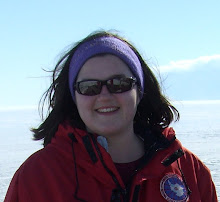Hulu desktop has changed my TV watching with my new Mac Mini. I work on my laptop in bed while using just the Apple remote to choose programs. (I am happy to report that Peep Show Season (or Series for the Brits) 1 is available now on Hulu. But I have seen series 1-4 and want to see 5!)
One new show I have caught through Hulu is The Philanthropist, from NBC. It is yet another example proving that every actor from the HBO/BBC show Rome gets a chance at starring in their own network program, whether it is a good idea or not (I liked Journeyman starring Kevin McKidd, and he seems to have found a home on Grey's Anatomy now.) James Purefoy, who played Marc Antony on Rome, is the philanthropist Teddy Rast, a wealthy entrepreneur who takes to doing good acts in person instead of solely giving money following the death of his son, a bitter divorce, and a touching experience in Nigeria. His married business partners are played by Neve Campbell (she's an adult now) and Jesse Martin (always a sure choice). The show is loosely based off the life of Bobby Sager.
The plots do stretch one's credulity, and the pace and editing of the program can be a bit-offsetting as well. Yet, I was happy enough to be entertained by the first two episodes. The mostly ambivalent but hopeful reviews I see on the blogosphere capture my sentiments as well. But a co-worker was vehemently against the premise of the show and it is this view of philanthropy that I wish to address here.
My co-worker argued that in the real world it is almost always better for a wealthy entrepreneur to run a large successful, ethical corporation that does not exploit people or the environment while giving money to charities that have an expertise in their field. What such an individual should not do, is precisely what the character Teddy Rast does in the pilot episode, putting himself in physical danger to deliver some vaccine to one remote Nigerian village.
From an initial rational and economical perspective, I had to agree. Even on a personal level, my own experience of the futility on the charity front-line (when I was in the AmeriCorps and a member of the National Readiness and Response Corps of the American Red Cross, working in Anchorage, AK) made me certain that I could do more for the world from a further distance. (I am not the person I want to be, and a year or so after my AmeriCorps year I had stopped all regular volunteering and trying to do more for the world.)
Then my gut, and second level rationalizations turn on. Surely we need to take into account the impact upon the doer and receiver of direct charity. Helping someone in person will keep you more likely to write the big checks. Knowing that someone important or wealthy cares can raise the spirits of the receivers, and of course the publicity that can be brought to a cause amplifies the small acts of the influential individual. But this implies that one should not toil away in obscurity and quietly do good, and this removes much of the one-on-one benefit and purity of the experience.
At college reunions I often chastise friends who had espoused the loftiest ideals, but who are not consultants or corporate lawyers. Their arguments about being the people who write the checks to help the groups they support have rung quite hollow to me. So do we as a society value those people who give time and effort more than those that just give greenbacks? Is it right to do so?
The NYTimes' Ethicist, Randy Cohen, writes in his Moral of the Story blog about a similar wealthy first-worlder helping out individuals from the third-world, in this case Madonna adopting a Malawian child. Although the issues of adoption exceed those I have brought up, many of the issues are the same. In my own head I cannot determine what the best course of action is with regards to charity, and it seems that as whole our western society is torn on the the issue also. Maybe a few more episodes of the The Philanthropist will help clarify my thoughts.
-------Edit 7/9/9 ----------------------------
Nick Kristof has a column today discussing another aspect of this problem: the length we will go to help one person, and the difficulties found when trying to help a larger number of people at once.
Subscribe to:
Post Comments (Atom)

No comments:
Post a Comment